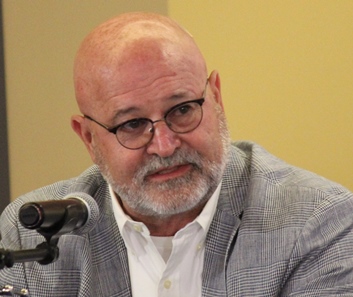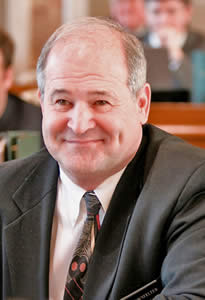
by Mary Rupert
Note: The election totals were updated on Thursday to Aaron Coleman, 800, Rep. Stan Frownfelter, 797, a three-vote margin.
State Rep. Stan Frownfelter, D-37th Dist., said he was shocked by Tuesday night’s election results. He was one vote behind challenger Aaron Coleman in the Democratic primary at the end of the night.
Coleman, 19, upset Rep. Frownfelter in the closest contest in Wyandotte County on Tuesday. The election is not over yet, though.
There still may be votes left to count in the mail, as ballots postmarked by Tuesday have until Friday to get to the Election Office. Also, there are hundreds of provisional ballots that the Board of Canvassers will decide on Aug. 17, Rep. Frownfelter said. After those results, he will determine if he will ask for a recount.
“Anytime you run for office, you know something might happen,” said Rep. Frownfelter, who has served 14 years in the Legislature. Still, he believes he represented his territory and did a good job for the residents there, he said.
While he doesn’t know exactly how many votes are still out within the 37th District, there may be 400 to 600 more votes that may be considered, when the mail ballots are added to provisional ballots, Rep. Frownfelter said.
Frownfelter’s opponent, Aaron Coleman, said he went door-to-door to at least 70 percent of the homes in the district, talking to voters. A Bernie Sanders supporter, Coleman also said on Wednesday that he thought the election results showed the strength of the progressive movement.
The 69-year-old legislator has been in office since 2007 and has been a strong supporter of the rights of workers. He said he also campaigned door-to-door in July.
“I did as much as I could with the heat and everything, walk an hour, sit a bit,” Rep. Frownfelter said.
Rep. Frownfelter said although there was a good turnout overall in Wyandotte County, around 28 percent, in his district in Turner there was less than 10 percent turnout. Only about 1,500 out of 22,000 voters in the district cast a ballot by Tuesday night.
“That doesn’t show a good representation for our area at all,” he said.
Inappropriate statements
In the last week before the election, Coleman was criticized for social media comments he made concerning Herman Cain and others, saying Republicans deserved to fall ill or die if they didn’t wear a mask. His statements blew up before the election. Coleman has been a member of the Young Democrats, but ran for governor previously as an independent.
The Kansas Young Democrats on July 31 issued an apology and stated that they “strongly condemn this type of rhetoric.” The state Young Democrats also urged people to vote for Rep. Frownfelter.
Rep. Frownfelter said he was shocked by Coleman’s social media posts. Rep. Frownfelter said he had never wished anyone ill will or death because they had a difference of opinion.
Coleman wrote on social media in response to the Kansas Young Democrats apology: “What is worse, joking about someone dying. Or actions that literally kill people. The answer: both are equally disturbing and should be condemned in every instance.”
Rep. Frownfelter said in order to get anything passed in the Legislature, they need 63 votes, and the Democrats have been around 20 votes short of that. So in order to get any measures through, they need to be flexible and need to work well with Republicans, he said.
Other legislators talked Rep. Frownfelter into running again
Rep. Frownfelter earlier had been discussing retiring from the Legislature this year, and mentioned it during a televised forum while running for a Board of Public Utilities seat in 2019.
“I’ve seen my time there, it’s time for me to leave,” he said at a community candidate forum for Board of Public Utilities candidates in 2019. (The forum is online at https://www.youtube.com/watch?v=bBoLBOTUa24&list=PLMfeRPiOepX3QCrG-AjEhV6mCBb7y_43O&index=3&t=0s.)
What he meant by that, he said today, is that if he had won the BPU seat, it’s likely that he would not have run again for the state Legislature. After he lost the BPU contest, other legislators talked to him and asked him to run again, he said.
Had he announced that he would not run for certain, there would have been a lot more candidates who filed in the Democratic primary, he added.
Redistricting and importance of the 2020 election
This 2020 election is important, Rep. Frownfelter said, because redistricting will be coming up in the Legislature.
He’s been through that before, and remembers how redistricting once drastically reduced the numbers of Democrats in the Legislature, from 48 to 33, by redrawing lines that made it harder to elect Democrats in some districts.
Besides redistricting, there are other important issues that could come up in the next session, such as Medicaid expansion.
In Tuesday’s primary in the rest of the state, more than 10 moderate Republicans lost to Republican conservatives, Rep. Frownfelter said. That included Sen. John Skubal of Overland Park, as well as Rep. Jan Kessinger of Overland Park.
Republicans mounting a challenge in Wyandotte County this year; GOP to field write-in candidate in 37th District
Wyandotte County Republicans are mounting a challenge this year, according to State Sen. Kevin Braun, R-5th Dist., the county’s GOP chairman.
Sen. Braun said this year they recruited candidates for every Wyandotte County position in the state Legislature.
“People deserve to have a choice,” he said. He said it is easier for Republicans to get legislation passed in Topeka, and that would benefit Wyandotte County.
While the general election ballot will not have a Republican listed for the 37th District contest, Sen. Braun said on July 27, in the week before the election, that there is a write-in candidate for the position, Kristina Smith. Smith serves on the Wyandotte County GOP committee.
Also, Rep. Valdenia Winn, D-34th Dist., has no opposition on the general election ballot, but Sen. Braun said Kendon McClaine will run as a write-in candidate for that seat.
Coleman said on Wednesday that write-in campaigns don’t work. He said he knew because he had tried it himself in the past. People get to the polls and just choose one of the options listed on the ballot, according to Coleman.
Rep. Frownfelter said he wasn’t sure how a Republican write-in candidate would do in the 37th District, but he knows they’ll try hard. They didn’t run against him in the past because they didn’t think they could beat him, he said.
Election Commissioner Bruce Newby stated that voter registration in the 37th District was 4,928 Democratic and 2,155 Republican in 2020, with Libertarians at 99 and 4,036 unaffiliated. Both parties’ registration was up from 2019, when there were 4,815 Democrats, 2,041 Republicans, 98 Libertarians and 3,897 unaffiliated voters.
Countywide, there were 42,987 registered Democrats and 15,559 registered Republicans for the 2020 primary election, according to Newby. Numbers for both parties increased since the 2019 general election, when there were 41,146 Democrats and 15,075 Republicans.
In addition numbers increased for Libertarian voters, 769 in 2020 compared to 723 in 2019, and unaffiliated voters, 27,841 for 2020 compared with 26,993 in 2019.
There were only a relatively few party affiliation changes this year, and most increases are due to new voter registration, according to the election commissioner.
Rep. Frownfelter said he always sat down and talked to everyone in the district who wanted to talk to him, and listened. He told them where he stood on issues and always said what he meant, he said. He always tried to do his best for the district. “I fought the whole way,” he said.
The only thing to do now, Rep. Frownfelter said, is to sit and wait until Aug. 17 and the canvass, “and that’s the hardest thing to do.”
To see an earlier story on the 37th District, visit https://wyandotteonline.com/19-year-old-turner-resident-leads-by-one-vote-over-veteran-lawmaker/

